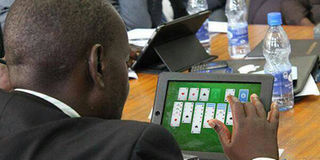Ipads for UPE schools not practical

Government just announced plans to procure tablets for pupils in Universal Primary Education (UPE) schools across the country. The move is intended to facilitate digital learning as a way of improving literacy and numeracy during the Covid-19 lockdown.
From the time Uganda was hit by the lethal pandemic, a lot has been taking place, but the scramble and partition of government resources cannot go unnoticed - all under the cover of curbing the spread of coronavirus. Huge sums of money have been released to us from different donors to effect the same cause. Items such as milk donated by the citizenry reached only a few. Food distribution remained insufficient and mainly those near the city centre had a glance on the Covid food. The distribution of mask does not seem to have been any better! (Are you thinking what I am thinking?).
Shortly afterwards, came a promise of distributing radios and TVs to villages, but even before this promises were fulfilled, plans of procuring tablets has been made. Anyone can testify that Internet charges in Uganda are very expensive, especially for those who operate online. Ideally, this would have been the best time to reduce Internet charges if the government really cares about the common man.
Let’s break down the obvious costs. On average, one needs about Shs2,200 to buy data of about 300 megabytes. That means that a parent must part with about Shs50,000 per month on just Internet charges. Since a parent whose child in a UPE school is likely not be using electricity, the same parent will be spending money on getting the tablet charged at Shs1,000 a day, meaning that about Shs30,000 a month. These are just net costs. Isn’t this like what the Queen of France then Marie Antoinette told her starving peasant subjects during the French Revolution? These are the same schools that lack pit-latrines, proper classrooms, and whose teacher-to-student ration is very high.
How can one plan to buy tablets for pupils whose families cannot afford a meal, school uniform, sanitary pads, etc?
How can one expect such a family to afford Shs3,200 a day? Moreover, it is planned that both parents and teachers will be involved in teaching children how to use tablets. But will parents who do not even have time to talk to their children get time to teach them. And how will children with disabilities be catered for? What if these tablets are mismanaged? A couple of years ago, tablets were given to MPs and it was evident that many of them were mismanaged. Some of the MPs even wanted to be exempted from paying the OTT. If MPs can feel the pinch of OTT, how about ordinary people?
The government and other stakeholders should always make realistic promises. Let MPs ask the masses what can best work for them in terms of education.


